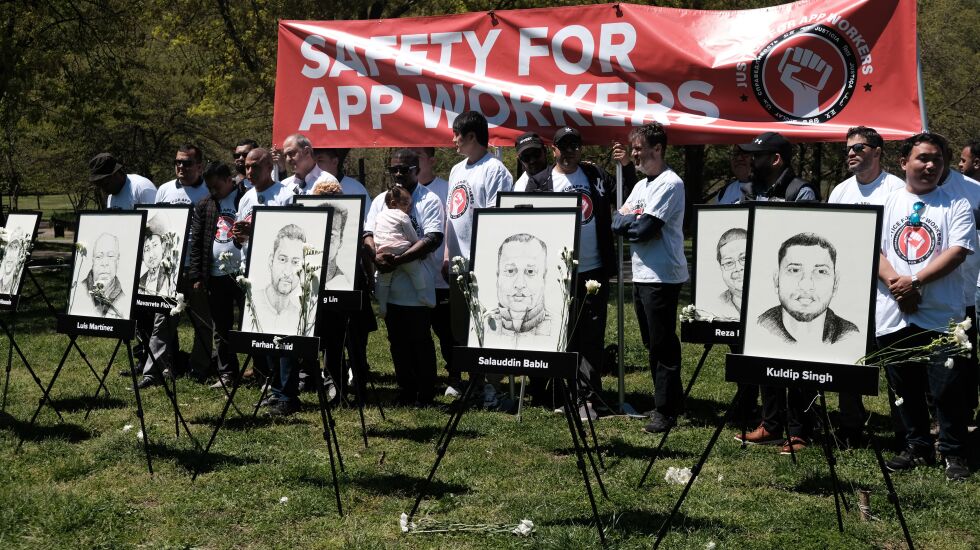
Imagine you’re driving through an unfamiliar neighborhood. You see a shadowy figure in the distance. Rolling up to the curb, you realize he’s your passenger. And he has a gun.
It’s a nightmare scenario for any app worker. I’ve driven for Uber in Chicago for six years, and these worries creep up all day. I worked long hours to keep our communities running during the pandemic, driving people to hospitals and making food deliveries. But COVID-19 brought another epidemic: alarming rates of carjackings and assaults against ride-hail drivers. Violence threatens our livelihoods and scares passengers.
That’s why Illinois ride-hail and delivery workers are coming together to fight the app companies for the protections and rights we need.
When I get behind the wheel, a target is on my back. Uber drivers have suffered over 24,000 reported assaults or threats of assaults, with little-to-no recourse. Last year, 44 Chicago ride-hail drivers had a carjacking, more than any other U.S. city and making up more than one-third of all driver carjacking reports nationwide.
Some workers lose their car or wallet in an attack or get injured. Others don’t make it, like Javier Ramos and Joe Schelstraet, both shot while on the job. Dozens more have been victims this summer, many in daylight. Now, folks install dashboard cameras or only drive around O’Hare and Midway airports. Many drivers are quitting out of fear.
I enjoy my job and want to stay on the road, but I am in a tough spot. My safety is at the whim of the app, which tells me who to pick up and where to go. Passengers can use fake names and attack drivers anonymously. Gas prices are hitting ride-hail drivers hard, too. The apps tacked on a $0.55 fuel surcharge this spring, but the program was halted in June, just as we saw record-high gas prices statewide.
These days, I’m driving 10 to 12 hours a day, six days a week, but shelling out more for groceries and rent. If I have an emergency or need a car repair, I don’t have money for it. Finding clean public bathrooms, especially at airports, also seems impossible. I can’t afford to decline trips because my account could get deactivated. In Chicago, if you get booted from one app, you get banned from them all.
Chicagoland ride-hail and delivery workers agree that we should not need to pick between safe working conditions, good pay and flexible hours. So 20,000 of us are launching a campaign demanding that app companies expand safety features to prioritize workers. Changes like additional account verifications, customer tracking and harsher punishments for perpetrators would help us all feel safer. We’re also calling for higher wages, access to sanitary public bathrooms and the right to collectively bargain. Our coalition is joining the thousands of New York app workers who united earlier this year.
Some might say that the app companies are already doing their part to keep drivers safe, but that’s untrue. Uber and Lyft have in-app safety features, but most focus on passenger safety, not drivers. App workers can call 911 through the app, but that’s a break-the-glass tactic, not a way to prevent dangerous customers from getting in our cars or placing a delivery. If this crisis is left unaddressed, more drivers will leave the industry or refuse to go to certain areas. Passengers will see fewer available rides and around-the-clock surge pricing. And it isn’t a money issue: Lyft just reported its highest-ever quarterly earnings.
Hard-working people built Chicago — and hard-working people like ride-hail drivers and delivery workers keep it thriving. I can’t count the times a passenger told me they hailed a ride because they didn’t want to ride on the el alone or needed to leave a bad situation. But amid a surge in carjackings and assaults, delivery workers and drivers deserve to come home safe, too.
If you’re a ride-hail driver, delivery worker or want to help fight for safer working conditions in Chicago, join our campaign. Visit JusticeForAppWorkers.org to learn more.
Manny Leyva is a full-time driver for Uber and a member of Latinos Unidos Uber y Lyft and Justice for App Workers Illinois. He lives in Stickney.
The Sun-Times welcomes letters to the editor and op-eds. See our guidelines.







